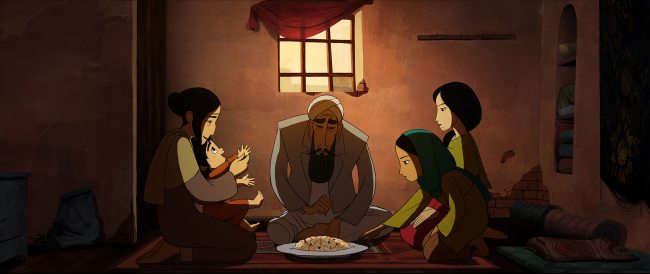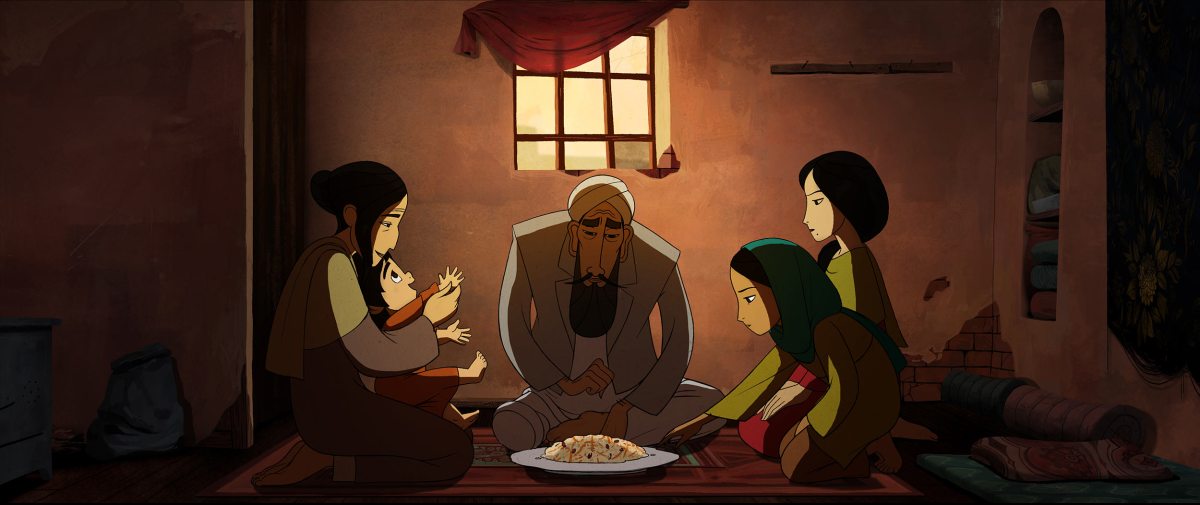Nora Twomey’s The Breadwinner is a beautiful adaptation of Deborah Ellis’ novel, and at the center of this narrative full of strong female characters is Parvana, voiced by 13-year-old Saara Chaudry. Chaudry’s lends her voice to Parvana, who herself plays several roles. In the film, she bickers childishly with her sister, tells grand stories to her younger brother, disguises herself as a young boy in order to travel and buy food, and pleads for the freedom of her father who’s unjustly arrested.
Chaudry, who read the Breadwinner years before, saw the role of Parvana not only as a “dream come true”, but also an opportunity to raise awareness about gender equality and the importance of education. To do Parvana justice, but also to do justice to all the Parvanas of the world, was her utmost priority in voicing the character.
TMS (Charline): What drew you to the role of Parvana, and what do you admire about her as a character?
Saara Chaudry: When I was 9 I asked my librarian to recommend a book for me to read over March break. She handed me the Breadwinner. I started reading the Breadwinner, the first novel in the trilogy, by myself. Part way through, there were some scary parts, so I asked my mom to read the rest of the trilogy with me. I could not put the book down and read the entire trilogy in 10 days.
Also over March break, I was preparing to audition for Little Cosette in Les Miserables. Reading the Breadwinner really helped me to understand Little Cosette’s suffering. I honestly believe reading the Breadwinner helped me to get into character and helped me to land the role.
A short while thereafter I was fortunate enough to meet Deborah Ellis at my school. I actually asked her if she would do a movie based on the book and she said it was a possibility. I was so excited when my agent called and said there was an audition for the Breadwinner. Getting the part was a dream come true.
Having read the entire Breadwinner trilogy as well as I am Parvana, was really helpful because I really got to understand Parvana and her different relationships — with Shauzia, her mother, her sister, and of course her father. Seeing her grow up through 4 books, I felt like I knew her and could really relate to her. I’m not sure why but I felt really close to her.
I really admire her strength and determination. Despite the terrible circumstances she finds herself in, she does not give up hope and struggles on until she finds solutions.

TMS: Storytelling is so important in The Breadwinner. Can you talk a bit about what storytelling means to you and why you think it’s important?
Chaudry: I have always loved listening to stories and story telling has always been very important to me. My dad is a great storyteller and growing up we used to lie in bed with my brother and sister and listen to my Dad’s stories of his childhood and growing up in Bradford. We even made up our own story that we added to every night. It was called the Land of Bazooka and was the story of 3 kids just like my family. Those stories helped put things in perspective for us and helped explain things that were going on around us. For example bullying, sickness, arguments with my sister.
So for me storytelling is learning about my family and where I came from. But it is also a way of helping me make sense of the world around me. And in the Breadwinner stories are used to learn the history of Afghanistan, and for Parvana, as a form of distraction and to make sense of the chaos around her.
For myself, I think I am drawn to stories that have characters that are like me – that perhaps look like me, having similar experiences. Or like Parvana, has characteristics I can relate to: a young girl the same age as me, from the same region of the world where my relatives came from. The Breadwinner made me realise that if my grandparents and great great great grandparents had not been as lucky to have moved to South Africa and England and then Canada, I could have been one of those Parvanas. This allowed me really to connect emotionally with Parvana. I felt like I could feel all her pain and suffering. And I could really relate to her and her relationships with her father, her sister and her friend Shauzia. The writing by both Deborah Ellis and Anita Doron was inspiring.

TMS: Were there any great challenges to voicing Parvana?
Chaudry: Making sure that I did justice to the amazing character Deborah Ellis created in Parvana. Making sure I got the accent correct. Making sure I could convey all of Parvana’s strength and character with just my voice.
Animation is very different to live action. With animation, you have only your voice, to convey your emotions and mood, and to give the character personality, to bring the character to life and make her believable
In this movie, the accent was also very important to be true to the characters. I looked for examples and practiced with Youtube at home. And then of course, while we were recording we had Kawa Ada (Razaq who was so helpful in making sure we got the accent correct). Having read the book, actually the entire trilogy as well as I am Parvana was really helpful because I really got to understand Parvana and her different relationships.—Shauzia, her mother, her sister, and of course her father.
But really Nora was the key to this. I could not have done it without Nora’s direction—she helped me to find something more out of each of Parvana’s lines and to really feel what Parvana was going through
I remember at the end – when Parvana is trying to get her father out of prison, Nora really pushed me to feel Parvana’s pain and suffering. I could feel Parvana’s anxiety and fear for her father, and how desperately she wanted to rescue him. Nora brought me to tears (in a good way). She was incredible.
TMS: The Breadwinner has been receiving so much great praise, have you had any notable encounters with people who have seen the film?
Chaudry: I think it’s wonderful that the movie has been receiving so much attention and praise, I am forever grateful for the support. One notable encounter I had with someone who watched the film was with a young girl who was 6 or 7 years old. She walked out of the theatre and told me that she wanted to be just like Parvana. I was speechless. The fact that other young girls are finding similarities with Parvana and are recognizing values/character traits that they want to emulate in their lives is incredible. This movie is all about creating awareness and starting a conversation. The fact that this young girl was able to do so, and was able to grasp that concept, is amazing.

TMS: What do you want people to take away from the film?
Chaudry: I think every young person should not only see the movie, but read the books (the entire trilogy). It has had such an enormous impact on me.
As a very luck child growing up in Canada, with every opportunity and one of the best educations in the world, it is hard to fully understand what other kids/ girls just like me, have to endure in other parts of the world. Deborah Ellis and the Breadwinner helped me to understand just how lucky I am and to raise my awareness about gender equality issues and to make me passionate about helping girls and helping them get an education.
The Breadwinner is a very realistic story of the angst and suffering of women and girls in Afghanistan, but at the same time it is a story of hope, determination and survival that everyone can relate to. Parvana is hopeful despite her dire circumstances. It’s a story of millions of girls and women all over the world who do not have equality and are denied an education. I remember Deborah Ellis talking about all the potential that we are missing out on. One of those girls may hold the answer to solve global warming or a cure for cancer, but their potential is being wasted by war and ignorance. When you educate a boy, you educate a man. When you educate a girl, you educate her family, her community, her country and the entire world. That stuck with me.
So for me the take away is to raise awareness and to start the conversation of the issues in the hopes that change will follow.
The Breadwinner opens in select theaters November 17th.
Want more stories like this? Become a subscriber and support the site!
—The Mary Sue has a strict comment policy that forbids, but is not limited to, personal insults toward anyone, hate speech, and trolling.—









Published: Nov 15, 2017 08:03 am